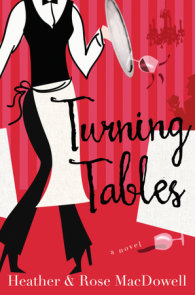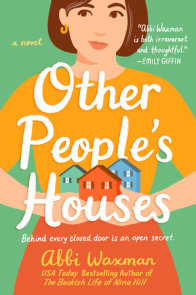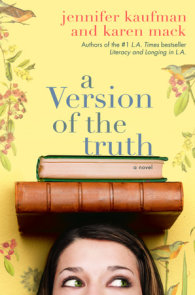READERS GUIDE
Questions and Topics for Discussion
INTRODUCTION
Forty-something Dana Stellgarten has always been nice to everyone, to a fault. These days, however, she’s got her hands full and her patience is wearing thin. She’s fresh out of a divorce—in a move that even she found painfully predictable, her husband left her for a younger woman—and trying to raise two children on increasingly limited funds in suburban Connecticut. Dana must essentially start over, make some new friends, learn how to date again, and find a job after being at home with her children for years.
If all that weren’t enough, her ex, Kenneth, continues to make her life miserable with his insensitive demands, and both of their children seem to be internalizing the pain of the divorce. Twelve-year-old Morgan is starting to exhibit some suspicious behavior, and Dana suspects that she might be in the early stages of an eating disorder. Her once happy-go-lucky seven-year-old, Grady is acting out in school, alienating his friends and irking his teachers. Determined to provide a better home life than she had growing up with her hapless mother and depressed father, Dana will do everything she can to make her kids feel safe, secure and loved.
Then one day Dana’s sixteen-year-old niece, Alder, arrives unannounced: She’s running away from home, though she won’t say why, and needs somewhere to stay, far away from her contradictorily controlling bohemian mother, Dana’s sister, Connie. Dana, kindhearted as always, can only say yes, hoping that she can somehow make the new arrangement work while finding a way to keep her infuriated sister at bay.
Even with all these moving parts, Dana eventually starts to settle into post-divorce life. She volunteers delivering meals to a local family in need. She starts dating Grady’s enthusiastic football coach. Nora, the popular and glamorous mother of Morgan’s new BFF, befriends her, and Dana feels flattered. But it’s when she begins working as a temporary receptionist for her dentist, Dr. Tony Sakimoto, that Dana finally finds a real connection, one that will teach her that nothing is more important than being true to your own heart.
Juliette Fay’s second book is a tender, often humorous, story of rising above the unexpected, sometimes disappointing circumstances of life. Dana is the quintessential everywoman, finding her own voice and inner strength just when she needs it most. Fay has a knack for creating authentic characters whom readers will come to love. With savvy dialogue and compelling emotional insight, Deep Down True is a novel with intelligence and soul.
ABOUT JULIETTE FAY
Juliette Fay received a bachelor’s degree from Boston College and a master’s degree from Harvard University. She lives in Massachusetts with her husband and four children. Her debut novel, Shelter Me, was on the Indie Next List, was chosen as a Target Bookmarked Pick for 2009, and was a 2009 Massachusetts Book Award Book of the Year. Deep Down True is her second novel.
A CONVERSATION WITH JULIETTE FAY
Q. While Dana and Kenneth’s divorce is a central event in this novel, it has mostly happened before the story begins. What inspired you to write this book and why did you decide to start the narrative where you have?
I was inspired by the fascinating crucible of the middle school experience, and how sometimes we as adults can be thrown back into those feelings of desperately wanting to belong, while also trying to follow our hearts. At any age these two things—belonging and being true to ourselves—can sometimes be hard to accomplish simultaneously.
The narrative starts after the divorce because the divorce itself isn’t as interesting as the way it shatters Dana’s complacency with the life she knows—a barely lukewarm marriage and an existence that revolves around everyone but her. It challenges her to stop settling for so little and start building a life that is worthy of her.
Q. The kids’ dialogue—from Morgan’s explanation of “emo” to Grady’s request for muscle-building pancakes—is pitch-perfect. How much of it comes from your own life as a mother? Do your children read your books?
I guess it’s kind of like moving to another country—eventually you learn the lingo. And for the stuff I don’t get right, I have a native speaker in my teenaged daughter, Brianna, who corrects my drafts. She’s the oldest and the only one of my four children who’s read my novels. The boys have never asked to. Maybe if I were writing thrillers or fantasy they’d be more interested.
I rarely if ever quote my children—or anyone’s children—in my books. I have too much fun making it up myself. But I do use little common phrases, mannerisms and reactions. As a writer I’m lucky to have such ready access.
Q. The theme of Dana’s volunteer work with the McPherson family provides an interesting point of contrast throughout the story, in some senses keeping Dana’s own troubles in perspective. What function did it serve for you as the author?
Making the dinners for the McPhersons is emblematic of Dana, who is such a selfless giver that even as her own life is falling apart, she never stops doing for others. The flip side of that coin is that it also serves as a self-soothing behavior. Her rituals of kindness keep at bay the harshness of a world where people kill themselves and husbands leave and kids are cruel. And hey, it’s food, Dana’s drug of choice.
The dinners are more than just food, though. They serve as an entrance ticket into the life of another family in the throes of even greater adversity than Dana’s. And it’s a way for her to tap into her true self, which is not about what she can do—she cannot fix anything for the McPhersons. But she can offer her particularly wonderful brand of compassion, which is one of her essential strengths.
Q. Your portrayal of bulimia is quite nuanced and believable, particularly the ways adults unwittingly reinforce kids’ negative behaviors. Did you research this topic or come to it more organically?
I did a lot of research, read reports, talked to experts, poured over Web sites, went to a conference. The Web sites that anorexic and bulimic girls themselves put up about what they do and how and why are absolutely haunting. I also interviewed a couple of adult friends who’d been bulimic. Ultimately I kept thinking back to a friend from my younger years who was anorexic. I confronted her and begged her to stop starving herself and she told me, “I want my mother to make me stop.” I’ll never forget it because it was then that I knew she was in for a long haul. Her mother was utterly checked out. It made me see that even as we are leaving childhood behind and insisting that we don’t need help, we want our parents’ guidance and leadership.
Q. Alder is a really compelling personality—a smart, surly teen with a truly compassionate heart and a natural way with metaphors—and in many ways she is the lynchpin of the novel. Was she an important character in the book’s conception, or did she come to be more prominent in later drafts?
Alder was there right from the start—even before Dana! I had originally envisioned her for my first novel, Shelter Me, but there wasn’t a spot that was quite right for her. So I knew I would include her in my next story, which turned out to be Deep Down True.
I’m glad I waited, because in her offhanded, teenagery way, Alder is the perfect role model for Dana. As they both struggle for healing and repair, Alder is willing to be alone or hang out with the very unpopular Jet. Refusing to cave to her domineering mother, she goes to Dana, who, Alder knows, will give her the support she needs without making her concede to outside expectations. And Alder quietly demonstrates for Dana how not to be such a doormat—from getting Grady to help clear the table, to standing up for herself in the final showdown with Ethan. Everyone should be lucky enough to have an old soul like Alder in her life.
Q. Early on, you write, “The story of Dana’s divorce bored even her.” Was it a challenge to take on the all-too-familiar trope of a middle-aged husband leaving his wife for a younger woman?
Not really. While it’s familiar, it’s no less dramatic because of the tsunami it can create in its wake. And I don’t really see this as a divorce story so much as an awakening that happens to have been launched by a divorce.
Q. Dana’s lack of assertiveness has gotten her into lots of trouble—in her marriage, in her social life, with her own family—and her journey in this book is to find her own voice amid the many forceful personalities in her life. Ironically, the less she seems to care about other people’s opinions, the more these people ultimately seem to like or at least respect the new Dana. Can you elaborate on this dynamic?
I think that in each one of us there is what some would call the True Self, or the Divine Self, or the Center. We get pulled out of that center all the time—by stress or disrespect or hormones or any one of a million things. And if we pay attention, we can feel when we’re in and when we’re out. There’s something very appealing about being with someone who knows her True Self and can be that self a lot of the time, because it helps us discover and love our own. Dana’s growing self-respect is ultimately a stronger draw than her relentless niceness.
Q. By being let into Dana’s head, the reader becomes acutely aware of the millions of decisions that must be processed on the fly in an average parent’s day. To your mind, what makes a good parent, and where do Dana and Kenneth fit in on that scale?
Oh my gosh, is there a harder question than what makes a good parent? Loving but not indulgent, attentive but not hovering, strict but not controlling… I can say all these things, but they hold different meanings for every parent and each kid may need a different balance of each.
Dana and Kenneth are well-intentioned parents. They love their children. But while Dana is a bit of a hoverer, Kenneth is fairly disengaged—just like in their marriage. They both learn to correct for that more by the end of the story. And they learn to parent better together as they do, which is tricky enough for married couples, and even harder—and more important—when there’s a divorce.
Q. The scene where Dana purges to feel closer to her daughter is both harrowing and poignant. Was this a difficult scene to write?
Absolutely. I never thought I’d ever write such a detailed account of vomiting, of all things! But while there are many examples of Dana’s failings, I wanted to show one of her great strengths, which is the length to which she will go to understand fully and be compassionate toward the people she loves.
Q. The notion of “deep down true” is a wonderful one—that we all have some essential truth of who we are and what we want inside. Did the title drive the story or did you arrive at the title in the writing process?
For my first novel, Shelter Me, I had a title in mind as I wrote that ultimately didn’t work out. This time, I decided not to title it until the end, and see what the story offered up as a suitable name, which I think it did in Deep Down True. There was, however, a phrase that I kept in the forefront of my mind as I wrote to hold me on course. That phrase was “the tension between being true to yourself and being liked,” which, while not a good title, was a very helpful compass for the journey.
DISCUSSION QUESTIONS




















